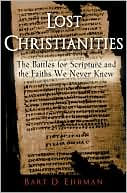

COURSE DESCRIPTION
In this class, we take the test case of early Christianity (in the first through sixth centuries C.E.) and ask how major religious traditions deal with the dual problems of diversity and unity. How does a religion that makes claims to singular unity (“orthodoxy”) deal with the existence of multiple forms of diversity (“heresy”)? More broadly we ask: How do religious define themselves? What processes, ideas, and concerns emerge at the boundaries of religious identities? What kinds of difference are allowed within a religious tradition, and what kinds of difference are deemed beyond the pale? Who makes these decisions, and how? What role do categories like culture, politics, and power play in such decisions?
This class assumes no prior knowledge of religious studies, early Christianity, or the ancient world in general. By the end of this class students will be able to:
COURSE MATERIALS
Our primary materials for this class are the original texts of the so-called heretics and their detractors (in English translation), along with select scholarly analyses and occasional theoretical approaches to the question of deviance and difference.
The following required books have been ordered for this class:

Arland Hultgren, The Earliest Christian Heretics: Readings from their Opponents (Augsburg Books, 2008)

Bart D. Ehrman, Lost Christianities: The Battles for Scripture and the Faiths We Never Knew (Oxford, 2003)
* Also available as an e-book through the Claremont Libraries (note, you must be logged into a Claremont terminal to access)
Additional primary texts and secondary sources will be posted online on Sakai (these sources are indicated in the syllabus below by an asterisk [*] and will also be directly linked on the main course website) or are available publicly on the internet (these sources are underlined on the syllabus below, and linked directly from the main course website).
COURSE REQUIREMENTS
Grades will be based on the following:
1. Participation (15%). More than four absences will result in a lowering of your participation grade. Full credit for participation means showing up (on time, please) and actively participating in class. You are not expected to have mastered and completely understood the day’s readings before coming to class, but you are expected to have read them carefully and have something to say about them (questions, comments, insights, confusions). Although there will be some lecture by the professor (for context and information), most of the class will be conducted as discussion.
2. Debates (15% each, 30% total). The class will hold two debates during the semester, debating the merits of Gnosticism and Arianism, respectively. Each student will serve as a debater in one debate and a judge in the other, and all participants will be graded on their participation in the debate as well as a post-debate write up (details on the debate and write-up can be found on the course website). The debates will be held on February 23 and April 6; the debate write-ups will be turned in to DropBox on Sakai by noon on March 3 and April 14 (note: these are not class meeting days).
3. Midterm exam (25%). An in-class exam on the material covered in the first half of the semester will be given on March 11. Additional information will be posted on the course website.
5. Research bibliography (30%). Students will complete a research bibliography on the “heresy” of their choice; the bibliography should include a list of relevant primary (ancient) and secondary (modern) sources, with brief comments on each source and a brief (less than one page) summary of potential further research that might be conducted on this heresy. Details on the research bibliography, and a list of suggested “heresies” (including and supplementing those on the syllabus) may be found on the course website; it will be due on the day of the final exam, Friday, May 15 (there will be no final exam in the class). (Note: graduating seniors should turn their bibliographies in on the last day of class, May 6.)
Student accommodations: Students requiring academic accommodations should contact the appropriate person in their Dean of Students office in order to formalize accommodations (be ready to discuss appropriate accommodations and provide necessary documentation). Accommodations may not be provided for students who have not registered through their Dean of Students Office.
College accommodations coordinators are:
Scripps - Sonia De La Torre-Iniguez, sdelator@scrippscollege.edu
CMC - Julia Easley , julia.easley@claremontmckenna.edu
Pitzer- Jill Hawthorne, Jill_Hawthorne@pitzer.edu
Pomona - Jan Collins-Eaglin, Jan.Collins-Eaglin@pomona.edu
Harvey Mudd – Nikki Ayers, nayers@hmc.edu
Scripps College’s policy on academic honesty: “Cheating and/or plagiarism seriously violate the principles of academic integrity that Scripps College expects its students to uphold. Academic dishonesty is not tolerated at Scripps and may result in suspension or expulsion from the College. (See the current Guide to Student Life, pp. 90-93.)”
IMPORTANT DATES
Mark your calendars now!
February 2: Last day to add a class
February 23: First debate
March 3: First debate write-up due by 12noon
March 11:
In-class midterm
March 12: Last day to drop a class
April 6: Second debate
April 14: Second debate write-up due by 12noon
May 15: Research bibliography due